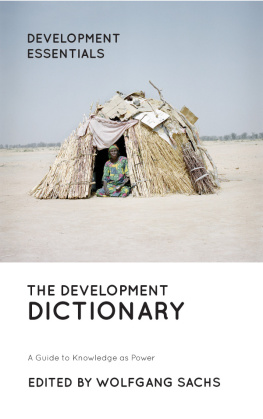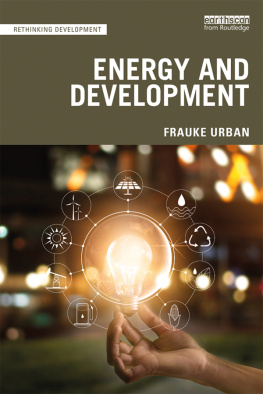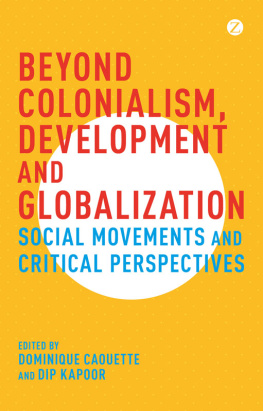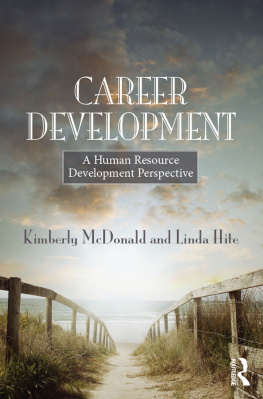
ABOUT THE EDITOR
Wolfgang Sachs is an author and research director at the Wuppertal Institute for Climate, Environment and Energy, in Germany. He has been chair of the board of Greenpeace Germany, a member of the Intergovernmental Panel on Climate Change and is a member of the Club of Rome. Among the various appointments he has held are co-editor of the Society for International Developments journal Development ; appointments he has held are co-editor of the Society for International Developments journal Development; Institute for Cultural Studies in Essen. He regularly teaches at Schumacher College and as Honorary Professor at the University of Kassel.
Wolfgang Sachss rst English book, For Love of the Automobile: Looking Back into the History of Our Desires , was published by the University of California Press in 1992. Several of his works have been published by Zed Books. They include the immensely inuential Development Dictionary: A Guide to Knowledge as Power (edited, 1992, 2010), which has since been translated into numerous languages; Global Ecology: A New Arena of Political Conict (edited, 1993); Greening the North: A Post-Industrial Blueprint for Ecology and Equity (co-authored with Reinhard Loske and Manfred Linz, 1998); Planet Dialectics: Explorations in Environment and Development (1999); and (with T. Santarius et al.) Fair Future: Resource Conicts, Security, and Global Justice (2007).
This edition is dedicated to the memory of Ivan Illich (19262002)
and Jos Mara Sbert (19452006)
The Development Dictionary
a guide to knowledge as power
EDITED BY WOLFGANG SACHS
THIRD EDITION

The Development Dictionary: A Guide to Knowledge as Power was first published in 1992 by Zed Books Ltd, The Foundry, 17 oval Way, London, SE11 5RR
www.zedbooks.co.uk
This edition first published in 2019
Editorial copyright Wolfgang Sachs 2019
Copyright in this collection Zed Books 2019
The right of Wolfgang Sachs to be identified as the author of this work has been asserted by him in accordance with the Copyright, Designs and Patents Act, 1988
Typeset in Monotype Van Dijck by illuminati, Grosmont
Index by John Barker
Cover designed by Kika Sroka-Miller
All rights reserved. No part of this publication may be reproduced, stored in a retrieval system or transmitted in any form or by any means, electronic, mechanical, photocopying or otherwise, without the prior permission of Zed Books Ltd
A catalogue record for this book is available from the British Library
ISBN 978-1-78 99-750-0 hb
ISBN 978-1-78 99-751-7 pb
ISBN 978-1-78 99-752-4 ePub
ISBN 978-1-78 99-753-1 PDF
ISBN 978-1-78 99-754-8 Mobi
Printed and bound by CPI Group (UK) Ltd, Croydon, CR0 4YY

Contents
| WOLFGANG SACHS |
| WOLFGANG SACHS |
| WOLFGANG SACHS |
| GUSTAVO ESTEVA |
| WOLFGANG SACHS |
| C. DOUGLAS LUMMIS |
| MARIANNE GRONEMEYER |
| GRALD BERTHOUD |
| IVAN ILLICH |
| WOLFGANG SACHS |
| MAJID RAHNEMA |
| ARTURO ESCOBAR |
| BARBARA DUDEN |
| MAJID RAHNEMA |
| JEAN ROBERT |
| JOS MARA SBERT |
| VANDANA SHIVA |
| CLAUDE ALVARES |
| HARRY CLEAVER |
| SERGE LATOUCHE |
| ASHIS NANDY |
| OTTO ULLRICH |
WOLFGANG SACHS
D evelopment is one of those zombie categories that have long since decayed, but still wander around as a worn-out utopia. Apparently buried long ago, the concepts ghost is still haunting world politics. Despite the huge upheavals in world affairs recently, all the sudden development appears to have a great come-back. For authoritarian leaders are obsessed with old- style development . With the rise of national populism, however, the idea of development no longer plays an inspiring, forward-looking role, as it did in the days of decolonization of nation states and even at the time of deregulation of global markets. The Trumps and the Bolsonaros, the Ergodans and Modis of this world still believe in development , with large-scale projects, mass purchasing power and unregulated movements for corporations, but the idea has become stale and institutionally ossified. Therefore, it is not surprising that the national populists, besides authoritarian and xenophobic, are declared enemies of the environment. They promise their followers a roll-back of environmental politics; in fact, they are great fans of the brown economy, rejecting a green economy. Their image of development is shaped by fossil energy and, more generally, extractivism of natural resources, just as during the heyday of the development period. National populists are longing for the industrial past; they are not oriented to the future, but to the past.
However, there is a crucial discontinuity in the development agenda of national populists: they are ethnocentric and selfish. While since the Second World War development, for better or worse, was always conceived in the framework of multilateralism, with the inauguration of US President Donald Trump the wind has turned. America first is the battle cry of unilateralism. The interests of ones nation are of primary importance, those of others are negligible. His echo resounds, for example, with Matteo Salvini, currently the strong man of Italy: Primi gli italiani serves him to deny entry for refugees in distress at sea. In short, the zombie development continues to make all kinds of mischief, a long way from the insight that the Age of Development has long since been finished; by now giving way to worldwide efforts in technology and culture that can be understood in terms of post-development.
FLASHBACK
How naive we had been and a little pompous to proclaim the end of the development age! In the fall of 1988 at Pennsylvania State University, in the house of Barbara Duden, where we gathered our friends to Living Room Consultations, we began to draw up the outline of the Development Dictionary . On the track of Ivan Illich, who once had the plan to write an archeology of modern certainties, we wanted to explore the key concept of development, which, as we said then, stood as a ruin in the intellectual landscape. Lets remember: in the second half of the twentieth century the notion of development stood like a mighty ruler over the nations of the southern hemisphere. It was the rallying cry of the postcolonial era. The concept seemed to be innocent, but in the long run it turned out to be detrimental; as a kind of mental infrastructure, it paved the way for the imperial power of the West over the world.
When did the development age begin? In our Development Dictionary , we stylized President Harry S. Truman as a villain. In fact, on January 20, 1949, in his inaugural address to the US Congress, he labeled the homes of more than half of the worlds population as underdeveloped areas. The development age was opened with this speech the period of world history that followed the colonial age of the European powers. The development age lasted about 40 years and was replaced by the era of globalization. And presently there is another turning point: the rise of national populism.
What constitutes the idea of development? Consider four aspects. Chrono-politically, all nations seem to advance in the same direction. Imagine time is linear, moving only forwards or backwards; but the aim of technical and economic progress is forever fleeting. Geopolitically, the leaders of this path, the developed nations, show the straggling countries which way to go. The bewildering variety of peoples in the world is now ranked simplistically as rich and poor nations. Socio-politically, the development of a nation is measured through its economic performance, according to gross domestic product (GDP). Societies that have just emerged from colonial rule are required to place themselves in the custody of the economy. And finally, the actors who push for development are mainly experts of governments, multinational banks and corporations. Previously, in Marxs or Schumpeters time, development was used for an intransitive subject, like a flower that seeks maturity. Now the term is used transitively as an active reordering of society that needs to be completed within decades, if not years.
Next page












